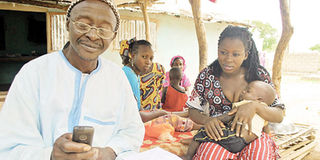Stage set to achieve universal health coverage in TZ

What you need to know:
- He further indicated his objective to table a bill to be in place in a couple of years, but at least before 2020.
- This is indeed a brilliant move and deserves to be commended. Health-care financing has been a great challenge to many governments in developing countries. There is still a great deal of dependence on donor funding, which in general makes the whole situation and healthcare system very fragile.
In his response during the parliamentary question and answer session, the Deputy Minister for health mentioned the intention of the government to adopt the universal health coverage.
He further indicated his objective to table a bill to be in place in a couple of years, but at least before 2020.
This is indeed a brilliant move and deserves to be commended. Health-care financing has been a great challenge to many governments in developing countries. There is still a great deal of dependence on donor funding, which in general makes the whole situation and healthcare system very fragile.
Certainly, as our economy continues to grow, so will our dependence decline. Nevertheless, the impact of funds from our development partners cannot be overemphasised.
Countries have deliberated on achieving universal healthcare coverage by 2030 as we are heading to attain sustainable development goals.
What entails having a universal healthcare coverage?
With universal healthcare coverage, all members of the society receive health services they need without necessarily financial hardship.
That is to say health services in its full spectrum, quality care treatment, prevention and palliation, as well as health promotion.
Basically, the compulsory national insurance, which is part of the universal health coverage strategy will enable financial pooling from all individuals which will allow them to avoid out of pocket expenditure during the time of need.
Although the contributions might be different depending on earnings and individuals economic levels, the goods and the services will be ripped equally among all.
How do we measure its achievement?
Currently the World Health Organisation (WHO) has proposed two indicator measures on how universal healthcare coverage could be measured in a country.
One is the extent of coverage of the population in accessing core health care services, namely; reproductive health, child health, infectious disease and non-communicable diseases to mention a few.
Second is the extent of out of pocket expenditure and how this impacts an individual’s financial status.
Globally it is estimated that 32 per cent of each country’s health expenditure comes from out of pocket.
It is important to say, universal health coverage will not be about free coverage for any health intervention.
Certainly a prioritisation on what is covered will be done to ensure wide and progressive coverage.
As we move towards this strong and reliable way of financing our healthcare it will be important to emphasise on prevention and public health interventions.
This in turn will reduce our expenditure on curative and palliative treatment. Eventually this will allow room for investment in the healthcare system, that is, infrastructure, diagnostics and human resources.
As the government is planning for universal health care coverage, two points will remain relevant to the success of universal healthcare coverage in Tanzania;
• First, human resource for health, the government will need to scale up the uptake of healthcare professionals across different cadres in order to meet the demand.
• Second, the government will need to strengthen primary healthcare facilities which are indeed the first point of healthcare contact for the majority.




